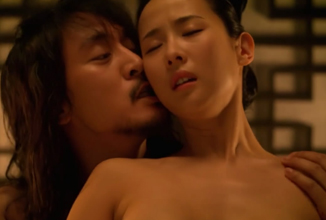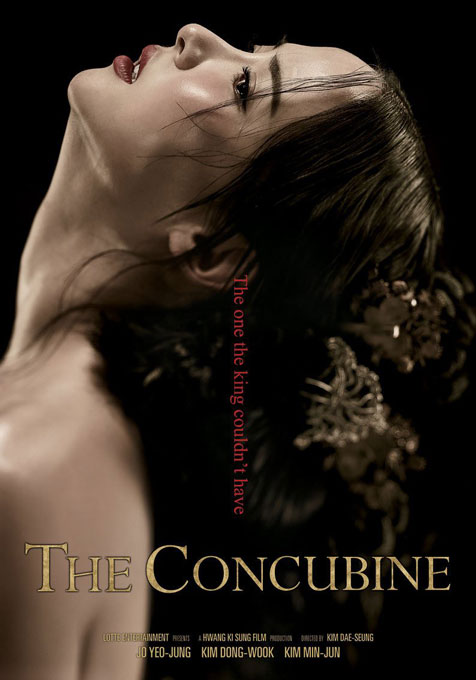"Although all of the women in the palace are yours to have, don't you know there is one woman you can't touch?
If I cannot keep the bee from the flower, I must remove the flower to solve the problem."
Synopsis:
On catching sight of local beauty Hwa-yeon (Jo Yeo-jeong) for the first time, Prince Seong-woon (Kim Dong-wook) is instantly infatuated with her and determines to make her his in spite of the fact that she has already given her heart to Kwon-yoo (Kim Min-joon). However, Seong-woon's mother, Dae-bi (Park Ji-yeong), is utterly abhorred by her son's growing love for Hwa-yeon, whom she doesn't believe is good enough for him, and engineers to keep them apart by having Hwa-yeon brought to the Royal palace as a concubine to the king; her step-son.
Following the king's subsequent death, Seong-woon is installed as monarch (at least in name) but on being told by his mother that Hwa-yeon is still out of bounds - and therefore the one woman he cannot have - a tumultuous battle between them begins.
With Hwa-yeon caught right in the middle of this family war, the question quickly becomes whether the fight will ultimately be to the death…
Korean film narratives set in historical times readily lend themselves to cutting dissections of an outwardly pure, and even puritanical, society contrasted with far more salubrious but less obvious (and less openly acknowledged) elements bubbling below the surface, almost to the point of explosion. Add to that Korea's patriarchal history and the fact that (outwardly, at least) women within society only reached a footing even approaching being equal to that of men in fairly recent times, and in one fell swoop you have all the ingredients for multi-layered period tales of power, betrayal, lust, forbidden love and loss.
Director Kim Dae-seung isn't a stranger to making period drama thrillers set in the Joseon era - having written and directed 'Blood Rain' in 2004 - and in co-writing 'The Concubine' with Hwang Yoon-jeong and Kim Mi-jeong he and his two colleagues have created a searing period piece far more layered and beautifully intricate than most.
For, in its detailing of the struggles of "puppet" king Seong-woon against the true power in the kingdom - his mother - 'The Concubine' wraps its patriarchal elements within an overarching matriarchy; thereby instantly allowing for dissection and commentary on the male/female hierarchy at play both within the palace microcosm and historical society at large, at the same time as instantly guaranteeing an epic battle of wills (later extending both across characters and class) before even the first threat is made or first hand is raised in anger.
From the very outset of 'The Concubine', the individual stories of Seong-woon and Hwa-yeon run in tandem - Seong-woon’s growing yet unrequited love for Hwa-yeon initially being set against her doomed relationship with the man of her dreams, Kwon-yoo - and as the actions of others (both of high and low class) increasingly impact on them as individuals, their plights and the dangers they face become ever more intertwined:
 |
 |
When we first meet king-to-be Seong-woon, we find a man utterly unsuited to any real position of power and from the moment he catches sight of Hwa-yeon, she essentially becomes his only focus. On being ordered to move to the palace to (unwillingly) share the life and the bed of the current king, she comes to serve as the sole reason for Seong-woon's visits there; directly bringing about vengeanful thoughts in Dae-bi's head, in the process.
Of course, when Seong-woon becomes king following the death of his step-brother he finds to his dismay that Hwa-yeon is the one woman his position won't allow him to have; his determination to make her his own nonetheless setting the groundwork for the battle he will have to fight with his all-powerful mother.
However, not only is Seong-woon’s mother determined to keep him and Hwa-yeon apart at all cost, her desire to destroy Hwa-yeon and her young son by the late king - a legitimate heir to the throne - also becomes increasingly apparent to both Seong-woon and Hwa-yeon alike; adding yet another layer to the ever more twisted power-struggle at play.
While Seong-woon's fight to be more than just a puppet king; his efforts to keep Hwa-yeon safe; his desperation to make her love him and to find a way to ultimately be with her in spite of his mother (and regardless of what is deemed right within the palace hierarchy); and the fallout and consequences to others caused by the actions of all three, are the major story threads in 'The Concubine' they certainly aren't the only ones by any means and, in fact, a veritable multitude of sub-plots; relationships; power struggles and betrayals cascade, merge and impact on each other throughout the entire running time of the film.
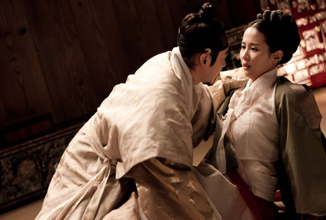 |
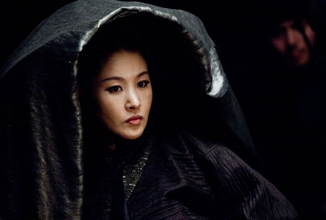 |
In lesser hands, this could easily have resulted in an overly intricate or muddled narrative, but Kim Dae-seung's exquisite direction deftly ensures that every single aspect sits in almost perfect harmony with every other; with each sub-story remaining as important to the overall story arc as it is to the individual character sub-plot from which it stems.
'The Concubine' is intricate and involved but grippingly so and though there is almost a plethora of sub-plots to follow as the narrative unfolds, viewers will find themselves doing so willingly and with ease; empathy routinely being elicited for the plights of the numerous individual characters in the process.
Marketed as an erotic period drama, 'The Concubine' is (as is the case in increasing numbers of Korean films) fairly graphically explicit in both content and visuals but never gratuitously so, in this instance - the level of nudity and adult content being similar to, for example, 'The Servant' (2010/Directed by Kim Dae-woo and also starring Jo Yeo-jeong in fairly exhibitionist role) or 'Portrait of a Beauty' (2008/Directed by Jeon Yoon-soo) - and, in fact, Kim Dae-seung's deliberately understated direction of these visually sumptuous ‘adult’ scenes serves to increase the eroticism present to a even greater degree.
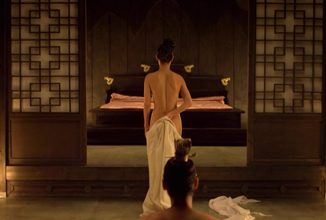 |
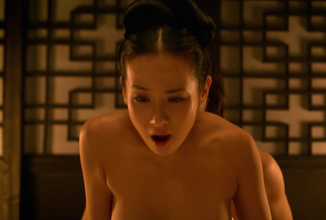 |
Cast:
Jo Yeo-jeong, Kim Dong-wook, Kim Min-joon, Park Ji-yeong
Summary:
A sumptuous and erotically-charged period drama, both visually and in terms of narrative content, 'The Concubine' is every bit as gripping as it is intricate; as involving as it is involved.
DVD:
The DVD edition reviewed here is the Korean (Region 3) Candle Media 2-Disc Limited Edition First Press edition, which comes in deluxe packaging with stunning artwork (including an inlay card) both inside and out. The film itself is provided as an anamorphic transfer with an aspect ratio of 1.85:1 and there are no image artifacts (and no ghosting) present. The picture is absolutely exemplary and compliments the beautifully rich visuals perfectly.
All in all, this is yet another example of the superb quality DVD releases which have been regularly coming out of Korea in recent years.
The original Korean language soundtrack is provided as a choice of Dolby Digital 5.1 and Dolby 2.0 and is easily equal to the superb image quality present. The musical score is also well balanced and nuanced throughout.
Excellent subtitles are provided throughout the main feature but English-speaking viewers should note that, as with many Korean DVD releases, there are no subtitles available on any of the extras.
DVD Details:
• Director: Kim Dae-seung
• Format: NTSC, Anamorphic, Widescreen, Subtitled
• Language: Korean
• Subtitles: English/Korean
• Sound: Dolby Digital 5.1, Dolby 2.0
• Region: Region 3
• Aspect Ratio: 1.85:1
• Number of discs: 2
• Classification: 18
• Distributor: Candle Media
DVD Extras:
• 'Making of' Featurette
• Character Profiles
• Stills Gallery
|



